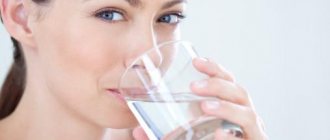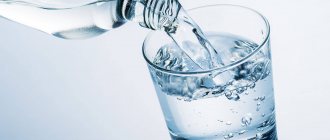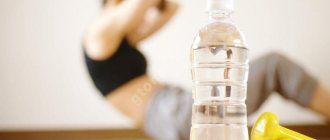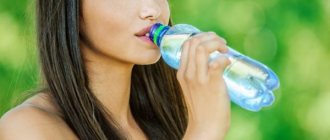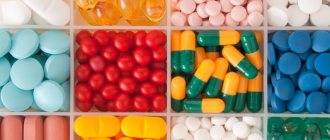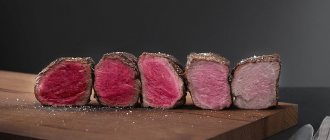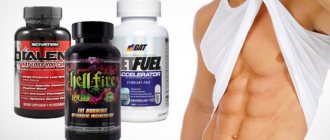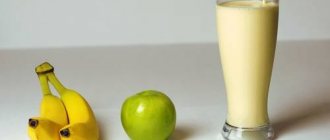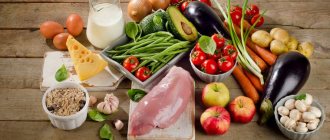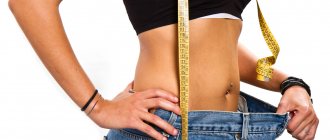The main myth about water balance
How many glasses of water should you drink a day? For years we have been constantly told that the body is dehydrated. And for optimal body function, you need to drink at least 8 glasses of water a day.
But some advisers went further: they advise drinking 2.5-3 liters per day. And the reward for such a daily feat is healthy skin and prolongation of youth. No, you definitely don’t need to force yourself to drink such a huge amount of liquid.
The birthplace of this myth is the USA. Answering the question of how much water you should drink per day, back in 1945, scientists from the American state association Food and Nutrition Board stated that an adult should consume 1 ml of water for every calorie of food. And this gave a total of up to 2.5 liters per day for men and up to 2 liters for women.
After so many years, few people are trying to dispel the myth. However, current experts missed an important detail: the same researchers from the Food and Nutrition Board association also said that most of the water requirement is already contained in food .
We get approximately 1.5 liters with any liquid and another liter as a component of any food, that is, it is not necessary to drink water in its pure form, it is in every product.
According to The USDA National Nutrient Database for Standard Reference, these foods have the following water content.
When should you drink more water?
Naturally, you have all heard that illness can be “drinked away.”
1. So you should drink more often and more if poisoning of the body has occurred. 2. If you have contracted an infectious disease. 3. Particularly at high temperatures. 4. Urolithiasis. 5. Drink more water if you have pyelonephritis. 6. For gout. 7. Especially if there is disease of the liver and biliary tract. 8. And also during the postoperative period.
How much water should you drink per day
But if not 8 glasses, then how many? Individual hydration needs depend on personal parameters: weight, height, environmental factors, level of physical activity, and so on.
However, there are certain recommendations for fluid consumption. According to rough estimates from the Institute of Medicine of the National Academy of Sciences of the United States, men aged 19 to 30 years old should drink about 3.7 liters of fluid per day, and women aged 19 to 30 about 2.7 liters.
Scientists also say that any liquid (coffee, tea, juice and others) is taken into account, even those contained in products. The same study also states that individual water needs vary and there are no uniform norms for fluid consumption.
Fortunately, a healthy person does not need to constantly worry about the amount of fluid he drinks. The body already has built-in mechanisms to maintain optimal water balance.
For example, when the body detects that there is not enough fluid, it releases an antidiuretic hormone - vasopressin . It increases water absorption in the kidneys and returns to the bloodstream to restore balance. But when this is not enough, the body turns attention to itself and makes you feel thirsty . Surely you will react and drink a glass of water.
Dr. Myasnikov argues that water consumption should be regulated by the feeling of thirst, and not by arithmetic . He advises drinking water only if you feel thirsty, there is no need to force yourself to do it.
World Health Organization (WHO) expert Bruce Gordon also believes that a healthy person does not need to drink 8 glasses of water daily. He spoke about this in an interview with RIA Novosti, an excerpt of which is presented below.
At the end of the interview, Bruce Gordon advised people to listen to their bodies and relax about their drinking habits.
But if you drink 2-3 liters of water, you can live longer
There is no scientific evidence to support the false claim that 2.5 liters of water per day increases life expectancy. A study was conducted in the Netherlands for about 10 years, in which over 120,000 volunteers took part.
The results were published in the British Journal of Nutrition: scientists did not find any direct connection between fluid intake and causes of mortality. People who drank a lot of water and those who drank little died from the same diseases.
There is also not enough evidence that drinking more water than our body requires provides any benefits.
Some people think that you need to drink water according to your weight. This is partly true, but as we have already said, most of the norm is found in food, and weight is not the only factor. In such a situation, the amount of liquid entering the body is difficult to calculate and you need to rely on thirst.
Why you need to trust your body
Beverage manufacturers actively continue to instill in people the rule of two liters or eight glasses a day. Not surprising, because selling the fear of dehydration is very profitable.
The human body consists of two-thirds water, it performs many important functions, so you can’t do without it. But it is worth remembering that a person does not need more water than his body requires .
Until recently, humans and almost all land animals had to develop and adapt in conditions of inconsistent access to water. Therefore, a system for maintaining fluid balance was a necessity, especially in drought conditions.
These are different times. But your body still sends you signals using a handy and virtually fail-safe tool to measure dehydration: thirst. If you want to drink, drink. It's simple.
What happens if you drink a lot of water
Is it possible to drink too much water? Although this sounds fantastic, it is really possible. Excessive water consumption can lead to so-called water intoxication , in which there is a serious decrease in the concentration of sodium in the blood (hyponatremia).
Symptoms of hyponatremia can range from nausea and confusion to seizures and even death in severe cases.
However, cases of water intoxication are quite rare. Those most at risk are professional long-distance runners who lose track of how much water they drink during a race, and small children learning to swim. Due to inexperience, the latter can “swallow” in the pool and suffer from loss of electrolytes.
If a person has diseases of the cardiovascular system and kidneys, and at the same time drinks a large amount of water (more than 2-2.5 liters of liquid), this can lead to serious consequences.
In 2007, an accident occurred at a radio station in California. The woman drank 6.5 liters of water to get a game console. Five hours after the end of the competition, she died of water poisoning.
What happens if you drink little water
In this paragraph we will tell you what will happen if you drink less water than our body requires.
- Weakness. If a person does not receive enough fluid, most processes in the body begin to slow down. As a result, a person begins to feel weak and quickly gets tired.
- Aging. Drinking enough fluids will help your body fight free radicals, which are known to damage cells and lead to premature aging.
- Overweight. Water itself does not in any way contribute to weight loss, but it helps cleanse the body of toxins and waste, which will subsequently have a positive effect on your figure. And sometimes the body confuses the feeling of thirst and hunger. Therefore, if you want to have a snack (namely a snack, a strong feeling of hunger and the desire to chew something can be easily distinguished), drink a glass of water.
What happens if you don't drink water?
(The video does not work on turbo pages; to view it, go to the main version of the site. Link at the end of the article.)
How water affects health
Water is involved in all biochemical processes of the body, such as:
- metabolism,
- digestion,
- hematopoiesis,
- regulation of blood pressure,
- thermoregulation,
- removal of toxins.
Disruption of these processes affects the condition of hair, skin, nails, as well as the functioning of all body systems, the musculoskeletal system, and the brain. No wonder doctors believe that dehydration can cause confusion and headaches. After all, the human brain is 75% fluid. It's the same with blood. The less water in our body, the thicker the blood and the higher the pressure. That is why hypertensive patients need to monitor their water balance especially carefully. When the body feels a lack of water, it begins to intensively produce histamine, a hormone responsible for the immune response in a situation that is alarming for the body. However, an excess of histamine activates not only the immune system, but also allergies. This is why maintaining a drinking regime for allergy sufferers is especially important. Water dissolves and delivers a variety of nutrients to tissues. Without water, normal functioning of joints and muscles is impossible. With its deficiency, the likelihood of arthrosis and osteochondrosis sharply increases due to the constant wear and tear of fragile cartilage tissue. People suffering from diabetes must control their blood sugar. Drinking a glass of water instead of juice or a sugary drink helps them keep their sugar levels under control. While drinks containing sugar can cause a sharp rise in its level in the blood and increase thirst.
Dehydration
When dehydrated, the body draws water from cells to maintain its most important functions. As a result, cell functionality is impaired. The blood thickens and moves more slowly, and accordingly, oxygen arrives with delays.
Signs that indicate you are not drinking enough water:
- feeling of thirst and dry mouth;
- dark yellow urine;
- peeling of the skin, cracks on it;
- headache;
- drowsiness and lethargy;
- cardiopalmus.
Unfortunately, at the very beginning, these signs may appear separately, not give an overall picture of the problem, or be attributed to the manifestations of other diseases.
Excessive fluid intake
Healthy adult kidneys can process up to one liter of water per hour. Anything more than this can be considered harmful and even dangerous. In ordinary life this practically never happens. However, under a number of circumstances this is possible, as a result of which a person may drink an excessive amount of water. Excess water, that is, drinking more than 4-5 liters of water per day, is fraught with the following consequences:
- increased kidney function;
- increased protein breakdown;
- increased sweating;
- leaching of the necessary salts and disruption of the salt balance;
- diluting gastric juice and slowing digestion.
In addition, people with liver and kidney diseases should be more careful when drinking water. Excessive intake of liquids for them can be hazardous to health. In this matter, they need to strictly adhere to the doctor’s recommendations.
Why Children and Older People May Miss Thirst Signals
Older people should be more careful about their fluid intake to avoid dehydration. Virginia Polytechnic Institute and State University professor Brenda Davey claims that after 60 years, the thirst mechanism becomes less sensitive .
Children may also have problems with timely replenishment of fluid in the body. Therapist Olga Kashubina believes that children often do not follow thirst signals , so parents need to monitor their water consumption.
It would be a good idea to offer your child water during the day, especially when walking in hot weather.
Can you lose weight by drinking a lot of water?
Judging by the reviews on the Internet, it’s possible! Followers of this type of nutrition note that in a month you can get rid of 7 extra pounds. But be careful with the quantity, you also can’t overdo it, otherwise it can have a detrimental effect on kidney function. How to calculate the required rate was stated above.
In addition to losing weight, drinking enough water improves the overall condition of the body: the skin becomes cleaner and more hydrated, and therefore looks younger, the quality of nails and hair also improves.
If the water balance returns to normal, then, according to some adherents of such a diet, the result in the form of losing some of the excess weight will not be long in coming. In just a week you can lose up to three kilograms! And this is just the beginning.
Remember that water that is retained in the body can hinder weight loss and cause swelling. To avoid problems with stagnant fluid, it is necessary, no matter how paradoxical it may sound, to avoid dehydration, and also not to overuse spicy, salty, smoked foods and semi-finished products, while not forgetting to monitor the level of potassium in the body.
The following products quickly remove excess water: watermelon, freshly squeezed juices, dried fruits, berries, ginger, citruses, pineapples, herbs, boiled rice, steamed buckwheat. You can use diuretic decoctions from various herbs, for example, lovage, wheatgrass, barberry or elderberry. To prepare such a drink, just pour boiling water over a spoonful of the herb, then leave it in a dark place for 15-20 minutes.
How to track dehydration: signs
If you're really concerned about hydration and want to track it, there's a home method. It may not be the most pleasant: check the color of your urine . Normal urine is colorless or light yellow. A dark yellow or sandy color may indicate dehydration.
Of course, dark color can also signal more serious problems. Therefore, balance testing should only be done if there are no other diseases.
Symptoms of dehydration:
- strong thirst;
- dry and rough lips;
- headache or dizziness;
- fast fatiguability;
- rare urination;
- weak pulse;
- decrease in blood pressure.
How to know how much water to drink
Doctors identify two key signs Nutrition and healthy eating that you have enough fluid:
- You don't feel thirsty.
- Your urine is colorless or light yellow.
It's like that? This means you can relax: everything is fine with your drinking regime, there is no need to fill yourself with additional volumes of liquid (even if you or someone else thinks that you are not drinking enough).
If at least one of the signs is present, you should consciously add a glass of water, compote, fruit drink or juice between meals: drinks will reduce the likelihood of dehydration.
The prospect of dehydration should be approached especially carefully if you are included in one of the following risk groups Nutrition and healthy eating:
Do you engage in physical labor or sports?
Any activity that makes you sweat is an obvious reason to drink an extra glass of water before, during, or after it, even if you don't feel like it.
You are in a high altitude or hot, dry climate
These environmental parameters cause you to sweat intensely (although the sweat may not be externally noticeable due to intense evaporation) and, accordingly, lose more fluid than usual. Losses require compensation: do not forget to carry a bottle of water with you and sip from it regularly.
You have a fever and/or vomiting or diarrhea
The higher the temperature, the more moisture the skin and the body as a whole lose (evaporate). Dehydration in this case is extremely dangerous because it increases. The more fluid the body loses, the less the body’s ability to resist disease, the higher the temperature. This means that moisture loss increases again.
Therefore, in such conditions, doctors recommend drinking as much as possible. This includes using oral rehydration solutions, which retain water and prevent dehydration.
You are pregnant or breastfeeding
The US Office of Women's Health recommends Healthy eating and women that pregnant women drink at least 10 cups (2.4 liters) of fluid, and breastfeeding women drink at least 13 cups (3.1 liters) daily.
Does water temperature matter?
Many people have probably heard that cold water can help you lose weight. So, there will be almost no result in this direction from drinking cold liquid.
A doctor from the University of Southern California has proven that by warming cold water in the stomach, the body loses almost no calories . The tiny amount of calories that are lost during this process does not affect anything. The scientist's name is Roger Clemens.
Cold water not only has no benefits, but can also cause harm.
- Low temperature water can damage tooth enamel.
- Cold water satisfies thirst worse than warm water.
Cold water also harms the stomach if you drink it after eating fatty foods . Because of it, the fat that enters the stomach is not digested. Further, moving into the large intestine, it can cause disorders. And the stomach itself strives to get rid of the cold, its walls contract, pushing out not only fat, but also all poorly digested food further into the intestines, where it simply rots . At this moment , the brain does not receive a signal that the person is full and you begin to eat even more.
It is on the latter principle that all fast foods are based, which include only iced drinks in combination lunches at a competitive price.
According to doctor Andrei Tyazhelnikov, cold water in hot weather can harm people with weak immunity, namely, cause an exacerbation of cardiovascular diseases.
How to lose weight with water without drinking it internally
It is not at all necessary to force yourself to drink a liquid that is not the most delicious in the world; you can use it in other ways.
Bath
Losing up to 1 kg of subcutaneous fat in just an hour is quite possible if you visit a sauna. Along with sweat, the waste and toxins dissolved in it will come out, and the skin will become younger.
Bath
It is important to know : for the process of losing weight using a bath to be effective, it is important to stop consuming any salty foods the day before the procedure.
Cold and hot shower
Another proven way to combine business with pleasure. During a contrast shower, the body experiences a shock, as a result of which a large number of calories are burned. In the morning, a contrast shower helps you wake up and at the same time improves your metabolism.
Attention : this procedure is prohibited for people suffering from diseases of the cardiovascular system, as well as pensioners and hypertensive patients
It is a mistake to believe that drinking a few cups of water a day is enough to lose those extra pounds. Alas, no matter how healing it may be, it is impossible to achieve good results in the fight against excess weight without diets and exercise. But helping the body get rid of a couple of kilograms a month with the help of water is a very real task.
Should you drink water in the morning on an empty stomach?
Is it healthy to drink one glass of water (or two) on an empty stomach? Yes, it's useful.
The Japanese have a useful habit: drinking a glass of water in the morning on an empty stomach. This is probably one of the many factors due to which the Japanese are leaders in the ranking of centenarians.
According to the source, the average life expectancy in Japan is 81 years for a man and 87 for a woman. While in Russia these figures are 66 and 77, respectively.
Water drunk on an empty stomach helps us wake up and starts metabolic processes in the body. Cleanses the body of toxins, promotes weight loss, improves immunity, thereby providing protection against infections.
Main:
- Drink warm water, at room temperature.
- After drinking a glass of water, you need to be patient and not eat for 20-40 minutes. During this time, water exhibits its healing properties; you can prevent this by eating.
- Drink a glass of water as soon as you wake up. More precisely: we woke up, brushed our teeth and drank water.
- It should be plain water, no juices.
- And, of course, don’t forget to drink water throughout the day.
Drinking a glass of water on an empty stomach seems easy, but what a huge effect this healthy habit gives. In the near future you will notice improvements in your body.
You might be interested in: Water with lemon on an empty stomach is a great combination to start a productive day.
In special situations
There are a number of situations and conditions that provoke an increased need for water.
- Smoking dries out the mucous tissues of the nasopharynx, which causes a decrease in local immunity and increases vulnerability to infections. Smokers need to increase water in their diet by 60%.
- Viral diseases and elevated body temperature force the body to lose a lot of moisture, so during illness it is advisable to significantly (almost double) increase water intake.
- Lactation. A large amount of fluid is required for milk flow. Any nursing mother should increase the amount of water consumed per day by an average of 50% and even 150% if there is little milk coming.
- During increased physical activity, athletes should drink twice as much water, because during training the body loses a lot of water through sweat.
- When taking diuretics, diarrhea or vomiting, the water balance must also be replenished with additional fluid.
During pregnancy
During pregnancy, some expectant mothers limit themselves to drinking due to fear of polyhydramnios. This is a misconception. Water is necessary for the proper course of pregnancy, and the amount of amniotic fluid is in no way related to the volume of fluid consumed, but is a consequence of previous diseases. Swelling is also a concern for pregnant women. However, water itself, even in large quantities, cannot lead to edema. But in combination with diabetes, with the consumption of salty and spicy foods, with the lack of the required amount of protein in the diet, you will be guaranteed swelling. If they appear, we recommend that you immediately consult a doctor to determine the exact cause of their occurrence.
Even during a normal pregnancy, you should not drink a lot of water in the evening. This can have a negative impact on the quality of your sleep.
What kind of water to drink: boiled, filtered or bottled
Boiled water
This is the most economical way to satisfy your thirst. During boiling, microbes die, chlorine evaporates, and excess salts settle at the bottom of the kettle, breaking it every six months (if we are talking about an electric kettle).
But if the water contains few salts, then boiling is not the best source of pure water. Plus, boiling will not cope with chemical pollution (for example: heavy metals, nitrates or pesticides).
Bottled water
You can drink bottled water, because it must meet all quality and safety criteria, but not all manufacturers operate in good faith. On the Roskachestvo website (“Russian Quality System”) you can choose water that will not harm the body and will be beneficial.
But not every person or family can afford to spend the budget on buying bottled water. Therefore, people are starting to think about buying a filter.
Filtered water
Important: the filter should not be with a reverse osmosis system . These make almost distilled water , that is, they strip it of any impurities.
Distilled water is the best solvent and, according to research by the World Health Organization, including in Russia, it flushes calcium and salts from the body, leading to joint and heart problems, exacerbation of ulcers, and anemia.
Chemist and water expert Maria Kuleshova argues that it is necessary to match the type of filter cartridge to the type of water . For example, filters designed for tap water are not able to remove bacteria from spring water. This function is not required, since chlorine kills bacteria in tap water.
And also to drink clean water, do not forget to change the cartridge on time .
We can conclude that buying a filter seems preferable to spending the family budget on bottled water or constant boiling, which cannot ensure complete safety.
What are the results of losing weight on water?
Of course, if you drink water and stuff, you won't see much. Or you probably won't see him lose weight. You can’t drink the same water and lose weight on it.
There are of course 3 diet modes, these are usually lazy, easy and complete.
I don't think we need to explain what this means. If you are lazy, you will not have any weight loss results, but if you lose weight intensely, you will still have results over time.
For example, if you strictly follow all the rules of the same water diet, then after about 1 week you can lose at least 5 kilograms. Of course, this number is not 100%, but you will definitely see the result.
What can't quench your thirst?
It turns out that not all drinks help us cope with thirst; some even cause dehydration.
There is no coffee in this paragraph , since according to a study by British scientists, with moderate (no more than 4 cups per day) and regular consumption, coffee does not dehydrate the body .
Alcohol
Neither cold beer nor any other alcoholic drinks will help you quench your thirst.
Alcohol dehydrates the body , which is also facilitated by its diuretic property . This is why many people wake up with a hangover after a night of partying.
Should you drink water during training?
Anyone who has ever set out to include their body in a regime of physical activity inevitably faces questions of proper drinking regime during training. Should you drink water during and after training? What kind of water is best to drink, and in what quantities?
Water can be called an essential element of training. It is the fluid, released in the form of sweat, that allows the body to regulate body temperature, avoiding overheating during exercise. Plus, water during exercise helps your body stay (or become) lean and toned. It is what helps the kidneys remove the breakdown products of fatty tissue. In conditions of dehydration, lipolysis (that same cherished breakdown) turns out to be difficult: activation and breakdown of fat reserves occurs with the participation of the liver, but with a lack of fluid, the liver becomes so busy with other functions, helping the kidneys cope with the “catastrophe”, that it simply has no time for lipolysis .
A sufficient amount of fluid is also necessary to maintain endurance and prevent disease and illness - dehydration does not make anyone stronger. A decrease in tissue water content by just 2-4% can reduce the effectiveness of strength training by 20%, and aerobic training by 48%. In addition, chronic dehydration reduces the shock-absorbing function of joints, making them more susceptible to injury. Well, it is obvious that for an effective, complete and safe workout, you need to accustom yourself to drink regularly and efficiently - quite often, between approaches, in small sips. Water after training will help replenish fluid reserves and perform all the same functions.
Drawing the line
| Brief excerpt from the article |
| Most of the water enters the body with food. |
| The amount of water consumed depends on the characteristics of the body. |
| Low or high water consumption has negative consequences. |
| Dark yellow urine may indicate dehydration. |
| Children and older people may miss thirst signals. |
| It is better to drink water at room temperature. |
| Drinking a glass of water on an empty stomach will be very beneficial for your body. |
| Filtered water is the golden mean between price and safety. |
| Alcohol and sugary drinks do not quench your thirst. |
Now I’ll repeat what was said at the beginning of the article, our body already has built-in mechanisms that allow us to feel approaching dehydration. So drink whenever you want.
Every year there are many studies and statements related to maintaining water balance in the body. Based on this, the article will be updated periodically. If you suddenly found some material before us, write about it in the comments.
Was there anything you didn’t like about this article, do you have anything to add, or did you find an error? Be sure to write about it in the comments. Not a single comment will be left unattended!
Article updated 10/04/2020
Strengthening the effect - healthy lifestyle to help
To enhance the effect:
- Exercise stress. During intense exercise, you can drink up to 1 liter before and after training, as you will lose moisture intensively. Formula: 40 ml times weight + 600 ml for men and 400 for women, multiplied by training time.
- Healthy eating. Eliminate or minimize salt, sugar, and sugar-containing foods. Fatty and spicy. Don't eat late at night. Boil, stew, bake. The menu includes the consumption of vegetables and fruits in their original form, light chicken meat. Nutritionists agree that water will help with weight loss if you follow proper nutrition.
This achieves two goals:
- Effective weight loss: gradual weight loss of 10 kg is distributed over 7 days, depending on the characteristics of the body and mood.
- Good physical shape is maintained.
Combine healthy dishes with the life-giving power of water and get double the effect.
Regulate your drinking regime
- Season. In hot summers, more moisture is lost in stuffy rooms.
- Lifestyle. The regime for a sedentary lifestyle and an active one differs towards an increase in the latter.
- Peculiarities. Increase your intake of clear fluids if you smoke or drink coffee. Even when traveling on an airplane, you need extra fluid.
Factors of influence
The rules of consumption are influenced differently by physical activity and diet. Let's look at how exactly.
Physical exercise
In order for exercise to bring only benefits, you need to follow a special drinking schedule:
2 hours before training – 0.2 l. tea or juice, immediately before exercise, another half glass of water.- Then take a sip (about 0.1 l) every 15-20 minutes. Thirst during sports is manifested by the viscosity of saliva and dry throat.
- At the end of the lesson, you need to drink a glass of water, then another 1.5 liters in an hour and a half.
During strength exercises, the body does not lose much moisture. Therefore, there is no need to periodically drink water. It is enough to drink when thirst arises, drink 1 - 2 glasses of water after training.
Staying on a diet
When reducing the number of calories consumed during a diet, you should not reduce the amount of H2O you drink . Its deficiency, of course, will lead to rapid weight loss.
However, the rapidly lost kilograms will then quickly return, while drinking water can reduce the feeling of hunger, helping to obtain a more sustainable result.
In addition, water during the diet will help maintain the beauty of hair, nails, and skin.

